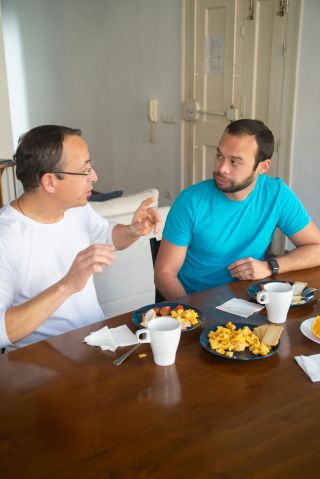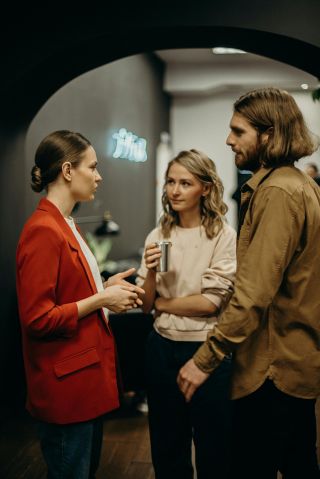Polyamory
What to Know When Considering Non-Monogamy
Practical aspects of living in polyamorous relationships.
Updated July 12, 2024 Reviewed by Jessica Schrader
Key points
- When beginning non-monogamy, people should seek support through therapy and others practicing non-monogamy.
- Practicing non-monogamy means balanced pacing, wariness about rules, and openness to mistakes and change.
- Finding community is necessary for building and exploring a polyamorous life.
I explore the joys and complications of consensual non-monogamy with therapist and media maker Sarah Stuteville, who produces the popular Seattle-based podcast, Mistakes Were Made, about relationships, politics, mental health, and non-monogamy.
Stuteville’s private practice specializing in therapy with LGBTQ+ and non-monogamous populations, the long-running podcast she hosts with her husband, and her own non-monogamous marriage give her distinctive expertise in the diversity and complexity of polyamorous relationships.
What follows is an interview focusing on preparing for and potentially practicing consensual non-monogamy. Answers to the first question are separated into central themes.
Robert Kraft: What suggestions can you offer to people just beginning a non-monogamous relationship?
Therapy and Other Forms of Support
Sarah Stuteville: First, I suggest that if you have the resources, you invest in therapy. If you are a couple moving from monogamy to non-monogamy, I recommend a relationship therapist with experience working with polyamorous people. Whoever you are, it’s likely that the experience of exploring non-monogamy will bring up challenging feelings—from communication style and attachment to identity and sexual expression.
What’s more, people who’ve spent much of adulthood as monogamous can find themselves emotionally thrust back into earlier stages of development, often around the time when they were last dating. This is an experience that's thrilling and full of discovery but also requires extra support.
In addition to therapy, support should come from building community with other non-monogamous people and safely talking about non-monogamy with friends and loved ones already in your life. Exploring polyamory in secret can be tempting because of the cultural judgment you might face, but doing it in isolation is far more difficult.
Moving Forward With Non-Monogamy
SS: I also encourage people to find a balance in pacing. Personally, I moved too quickly in my first years of polyamory and pushed my nervous system and boundaries to places that felt scary instead of exciting. But I also notice that some clients of mine keep poly exploration theoretical for so long that it becomes more intimidating as a result.

Stay close to what you’re ready for, but remember that experimenting and having fun is a big part of why you’re doing it. You’re allowed to try things and see how they feel.
And remember, especially for couples, that no two people’s pace is going to be the same. You’re not going to experience polyamory equally, and trying to have equal experiences can push people into activities that don’t feel right. Learning to tolerate the discomfort of a partner’s new experiences and relationships serves you better than busting through boundaries in an attempt to “keep up.”
Rules?
SS: And be careful about rules. When couples open up for the first time, it makes sense to want guardrails and agreements to help build communication and trust and a sense of safety. But I think inflexible rules like “don’t fall in love” or “tell me as soon as you’re chatting with someone in a dating app” can set people up to fail and break trust early on.
Regular Discussions
SS: One thing that my husband and I found really helpful in the beginning was to have a standing coffee date we called “Love and Money.” At this hour-long meeting once a week we caught each other up on where things were with other relationships and possible new connections. (We also used this meeting to make plans for going out with each other.) At the end, we’d talk finances and bills—because that’s another easy target for our arguments.
Setting aside this time gave us a structure for transparency and communication regarding dating other people, and it also became something that connected the two of us.
Which reminds me, if you’re a couple opening up for the first time, don’t forget to keep doing things together! It can be tempting to outsource all of the sex and romance into other relationships but, unless that’s what you want, remember to schedule intentional time with each other.
Missteps
SS: As per the title of our podcast, Mistakes Were Made, be aware that non-monogamy is a new experience in intimate areas of your life and a relationship style that has little modeling. You’re going to make mistakes, and that’s OK. That’s how you’ll learn some of your most important lessons.
.jpg?itok=pfoJLIkI)
For example, I made the mistake of trying to keep us from falling in love. We both did anyway, and because I built it up as a betrayal, that meant falling in love caused more damage to our marriage (and to us as individuals) than it had to.
We can have well-communicated boundaries and expectations with partners and build containers for our relationships that feel the right size. But still, we can’t predict feelings and we need to tolerate change—because people and relationships are always changing. Trying to control change creates more suffering, it doesn’t prevent it. That lesson, which I’m still learning, has been one of the most valuable of polyamory so far.
RK: People who practice non-monogamy can feel isolated, especially early in their relationships. What can they do to address familial and societal isolation?

SS: Finding community and support is necessary for building a polyamorous life. Fortunately, there are more and more meetup groups, happy hours, and social organizations gathering poly people together—though more so in larger cities than in less urban areas.
Also, I believe dating apps can build this community, as long as your profile is clear that’s what you’re looking for. Other social media can also help people feel validated in their experiences. My husband is active on poly Reddit, and I’m on poly Instagram.
And I strongly encourage people to take well-motivated risks in sharing their decision to explore polyamory with trusted friends and family (if they feel safe). It’s important that loved ones know what you’re going through.
RK: You had monogamous marriage for nearly 15 years and then began practicing non-monogamy in 2020. What led you to consider this radical restructuring of your marriage?
SS: It was a time of upheaval. The pandemic was raging, my husband had developed feelings for someone else, and I was feeling the pull to explore my queer identity. When I encountered non-monogamy through a human sexuality class I was taking, we both instantly recognized it as something we wanted to try. Of course, our initial enthusiasm quickly slammed up against the reality of being newbies, but I’ll always remember that first burst of excitement and recognition when we found a name for what we were looking for.
Before that, my husband and I always lived in unconventional ways. We inhabited chosen families1 and more collectivist communities. We valued relationships that extended beyond the conventional nuclear family and sought ways of living with more mutual support. Still, the norms around monogamy were so strong that we never considered having romantic, sexual, or physically intimate relationships with others until I was in graduate school to become a therapist.
RK: In a monogamous marriage, when a secret extramarital romance ends sadly, the bereft individual cannot seek comfort from a spouse. This can be different with consensual non-monogamy. What are your views on married couples in a non-monogamous relationship giving advice and support to one another about their other relationships?
SS: I’m all for it if everyone consents to the conversation, and personal boundaries and basic privacy are respected. Through polyamorous relationships (like all relationships), I am looking to grow, learn, and expand community. And like any type of relationship, if I’m struggling with someone I care about, I will seek advice and support from my husband, other partners, and friends. I’ll ask my romantic/sexual partners first if they’re OK with me sharing, but it wouldn’t work for me if I didn’t talk openly about my relationships with the people in my life.
To find a therapist, visit the Psychology Today Therapy Directory.
References
1. Chosen families are groups of people who function with the intimacy and commitment of blood-related or legally recognized family.




